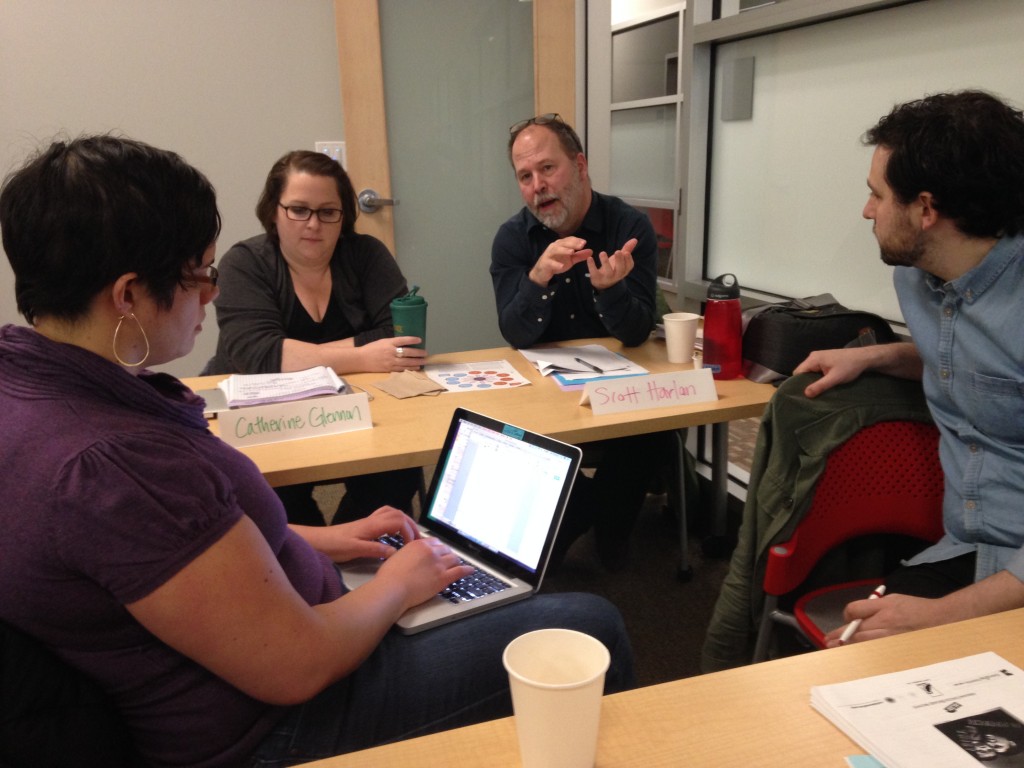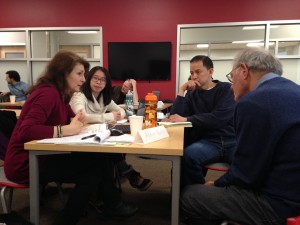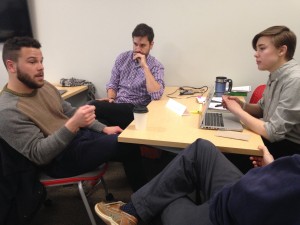America and World Fascism: ALBA Takes Its Teaching in a New Direction
ALBA has expanded the scope of its teaching institutes, moving from the Spanish Civil War to a broader and more ambitious focus on the role of the United States in the world, as well as the moral, political, and judicial aspects of the struggle for human rights. The time is right: “Fascism” was among the most looked up words in the dictionary last year.
What happens if we look at American history and U.S. foreign policy not as a struggle between isolationism and internationalism but through the lens of fascism and anti-fascism? How can we responsibly speak about fascism in the present? How do we help middle and high school students appreciate the past in all its complexity through the concept of historical empathy? How do we help them understand what fascism might look like today?
These were the questions that Peter Carroll and I spent two intense days considering together with some 30 History and Spanish teachers from Massachusetts public schools. With the invaluable help of master teacher Kelley Brown and Rich Cairn from the Collaborative for Educational Services, we considered a broad set of primary source documents ranging from letters of Lincoln veterans to speeches by F.D. Roosevelt, Charles Lindbergh, and Martin Luther King.
Recent political developments have moved large numbers of citizens to again appreciate the relevance of political organizing, judicial independence, and an independent media.
In consultation with Cairn and Brown, ALBA has expanded the scope of its teaching institutes, moving from the Spanish Civil War to a broader and more ambitious focus on the role of the United States in the world, as well as the moral, political, and judicial aspects of the struggle for human rights. The time is right for such a reorientation. Recent political developments have moved large numbers of citizens to again appreciate the relevance of political organizing, judicial independence, and an independent media. There is also a new thirst for historical knowledge to understand the present. “Fascism” was among the most looked up words in the dictionary last year. At the same time, the fact that the White House is occupied by a president who flouts the fundamental values of intellectual inquiry and integrity on a daily basis, poses new challenges for school teachers everywhere.
Five central questions guided the workshop: What is fascism? Who are its victims? What does it mean to resist fascism, and how were its leaders judged in the wake of the Second World War? What can we say about the presence of fascism in the postwar period? And, finally, how does the study of fascism in the past inform how we understand the present? In addition, master teacher Kelley Brown guided the participating teachers through various exercises in historical empathy—a concept meant to help high school students avoid the temptation of judging the past as critically separate from the present. Rich Cairn led an excursion through the hundreds of hate groups active in the United States today, as mapped by the Southern Poverty Law Center.
Grounding the workshop was an anthology of compelling primary sources. A letter by Lincoln vets Hy Katz and Canute Frankson underscored the fact that many of those who volunteered to fight in Spain did so because they felt fascism constituted a global threat. A fireside chat by President Roosevelt and a speech by Charles Lindbergh, both from September 11, 1941, made clear that fascism had important American supporters. An essay by Henry Wallace on the “Dangers of American Fascism” showed how the “premature” anti-fascism of the Lincoln volunteers had become mainstream by 1944.
An essay by Henry Wallace showed how the “premature” anti-fascism of the Lincoln volunteers had become mainstream by 1944.
The rise of fascism created a new awareness of the need to assist civilian victims, including political refugees. This is clear from compelling reportage from 1939 by Chicago journalist Jay Allen on the Spanish Republicans held in French refugee camps (see page # for Allen’s piece). Two excerpts from testimonies delivered at the Nuremberg trials sparked discussion about the complications of judging political crimes, and the way in which concepts like genocide and crimes against humanity helped reshape international law. A speech by the Rev. Martin Luther King, Jr., read alongside a speech by the historian (and Lincoln vet) Robert Colodny, helped bring home the connection between the 1930s and the Vietnam War. We discussed the effect of surveillance and political persecution in the United States during the Cold War through Crawford Morgan’s testimony before the Subversive Activities Control Board and a poem by Ray Durem dedicated to the FBI agent who tracked his every step for years. A recent report about U.S. volunteers fighting ISIS in Syria, finally, served to prompt a discussion about the value and limitations of historical analogies. The teachers spent the last part of the second day working on a lesson plan design incorporating these primary sources.
“Thoughtful, relevant, practical, and inspiring,” wrote a teacher in charge of 10th and 11th-grade U.S. and Global History in his evaluation, adding: “The workshop was highly applicable for my classroom practice as well as inspiring politically.” “The depth of the content was immensely helpful in educating me on this event and its ties to other events,” a 10th-grade U.S. history teacher wrote; “So amazing the knowledge the instructors shared with us.” “I already have plans to use this in a lesson for this year!” a 9th-grade Western Civics teacher said. “This was the best professional development workshop I can remember (and I have taught for over 20 years).”
This two-day institute was made possible by generous support from the Puffin Foundation, the University of Massachusetts, and the Collaborative for Educational Services.
Sebastiaan Faber, former chair of ALBA’s board, teaches at Oberlin College.















